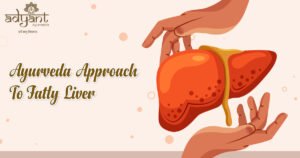
.
Table of Contents
Toggle🌿 Introduction
Psoriasis is a chronic autoimmune skin disorder characterized by accelerated skin cell turnover, leading to scaling, redness, and inflammation. Conventional medicine often uses steroids and immunosuppressants—effective yet temporary and often with side effects.
Ayurveda offers a natural, root-cause-oriented approach, focusing on detox, dosha balance, herbal medicine, and diet corrections.
📅 For appointments, call 9972541009 or visit Adyant Ayurveda centers in Bangalore.
⚖️ Ayurvedic Understanding and Pathophysiology of Psoriasis
In Ayurveda, psoriasis is closely related to Kitibha or Ekakustha, classified under Kshudra Kushta (minor skin disorders). It’s caused by imbalanced Vata, Kapha, and sometimes Pitta doshas, along with Ama (toxins) accumulation.
| Dosha | Role in Psoriasis |
|---|---|
| Vata | Dryness, flaking, itching |
| Kapha | Thick, sticky scales |
| Pitta | Inflammation, redness, burning |
Ama disturbs dhatus like Rasa, Rakta, and Mamsa, lodging in Twacha (skin) and causing chronic flare-ups.
🔎 Signs and Symptoms of Psoriasis
Red, raised plaques with silvery scales
Dry, cracked skin that may bleed
Itching, burning, or pain
Thickened, pitted, or discolored nails
Joint stiffness (psoriatic arthritis)
📅 Commonly Affected Areas:
| S. No. | Areas |
| 1 | Lower back |
| 2 | Elbows |
| 3 | Knees |
| 4 | Legs |
| 5 | Soles of the feet |
| 6 | Scalp |
| 7 | Face |
| 8 | Palms |
📈 Types of Psoriasis
| Type | Description |
| Plaque Psoriasis | Most common form with raised red patches & scales |
| Guttate Psoriasis | Small, drop-like lesions |
| Inverse Psoriasis | Found in folds like armpits/groin |
| Pustular Psoriasis | Pus-filled blisters, often widespread |
| Erythrodermic Psoriasis | Severe, potentially life-threatening |
| Nail Psoriasis | Nail thickening, pitting, discoloration |
| Scalp Psoriasis | Affects scalp, causing itching & hair loss |
💡 Why Choose Adyant Ayurveda for Psoriasis Treatment?
✅ 24+ Years Clinical Expertise
✅ Specialization in Panchakarma & Chronic Skin Disorders
Our Specialists:
Dr. Shree Lakshmi – Jayanagar (Skin + Panchakarma)
Dr. Manasa Srinivas – RR Nagar (Detox Expert)
Dr. Sumana – Indiranagar (Dosha & Diet Balancing)
Dr. Vidya – Kalyan Nagar (Herbal Skin Treatments)
💉 Ayurvedic Treatment for Psoriasis
💧 1. Panchakarma Detox
| Procedure | Action | Benefits |
| Vamana | Induced emesis | Removes Kapha & Ama |
| Virechana | Therapeutic purgation | Clears excess Pitta |
| Basti | Medicated enema | Deep Vata cleanse |
| Raktamokshana | Bloodletting | Purifies Rakta, reduces inflammation |
| Takradhara | Buttermilk pouring | Calms Pitta, soothes skin |
🌿 2. Herbal Treatments
| Herb | Properties |
| Neem | Antibacterial, reduces itching |
| Manjistha | Blood purifier, heals pigmentation |
| Turmeric | Anti-inflammatory, detox liver |
| Khadira | Clears blood, anti-itching |
| Guggulu | Vata-Kapha pacifier, anti-inflammatory |
| Aloe Vera | Cooling, reduces redness & dryness |
💊 3. Internal Medicines
| Medicine | Function |
| Arogyavardhini Vati | Liver detox, clears Pitta toxins |
| Mahamanjishtadi Kwath | Blood purification |
| Panchatikta Ghrita | Pitta-pacifying medicated ghee |
| Kaishor Guggulu | Reduces swelling, balances Rakta |
| Gandhaka Rasayana | Sulfur-based rejuvenator for chronic skin issues |
🍼 4. External Therapies
| Therapy | Use |
| Thakradhara | For scalp and full-body cooling |
| Lepa (Herbal Pastes) | Neem, Turmeric for itching and scaling |
| Winsoria Oil | Coconut base + Wrightia for scaling |
| Takra Lepa | Buttermilk + herbs for localized application |
🌟 Ayurvedic Herbs & Medicines for Psoriasis
| S. No. | Ayurvedic Herbs & Medicines |
| 1 | Madhaasava |
| 2 | Kanakasava, Triphalasava |
| 3 | Dashamularishta |
| 4 | Amrutarishta |
| 5 | Manjishtadi Kashaya |
| 6 | Patolamuladi Kashaya |
| 7 | Mustadi Choorna |
| 8 | Triphaladi Choorna |
| 9 | Mahatiktaka Ghrita |
| 10 | Maha Khadira Ghrita |
🍵 Home Remedies for Psoriasis
Aloe Vera: Soothes inflammation
Oatmeal Baths: Calms itching
Apple Cider Vinegar: Reduces flares
Turmeric Paste: Anti-inflammatory
Epsom Salt Baths: Detoxifies skin
Coconut Oil: Deep moisturizer
Dead Sea Salt: Reduces scaling
Yoga & Meditation: Manages stress triggers
❓ FAQs: Psoriasis and Ayurveda
Q1: Can Ayurveda cure psoriasis permanently? A: While a permanent cure is rare, Ayurveda provides long-term remission by addressing root imbalances.
Q2: How long does it take to see results? A: Mild cases: 4–8 weeks. Chronic psoriasis: 3–6 months or more.
Q3: Is Panchakarma necessary for all patients? A: Not always. It’s highly recommended for moderate-to-severe or recurring psoriasis.
Q4: What foods should I avoid? A: Avoid sour, fermented, spicy, processed, and incompatible food combinations.
Q5: Are there any side effects in Ayurvedic treatment? A: No major side effects when done under professional supervision.
🌿 Conclusion: Natural Relief through Ayurveda
Ayurveda offers a safe, effective, and individualized treatment approach to psoriasis. At Adyant Ayurveda, we address your unique dosha imbalance, clear toxins, and guide you on the path to lasting skin health.
📲 Book a Consultation: 9972541009
📍 Visit Us: Jayanagar | Indiranagar | Kalyan Nagar | RR Nagar
📅 Download the AyurCare App for online consultations
🔗 Read Also:
Ayurvedic Treatment for Eczema
Scalp Psoriasis Remedies
Panchakarma for Skin Disorders





